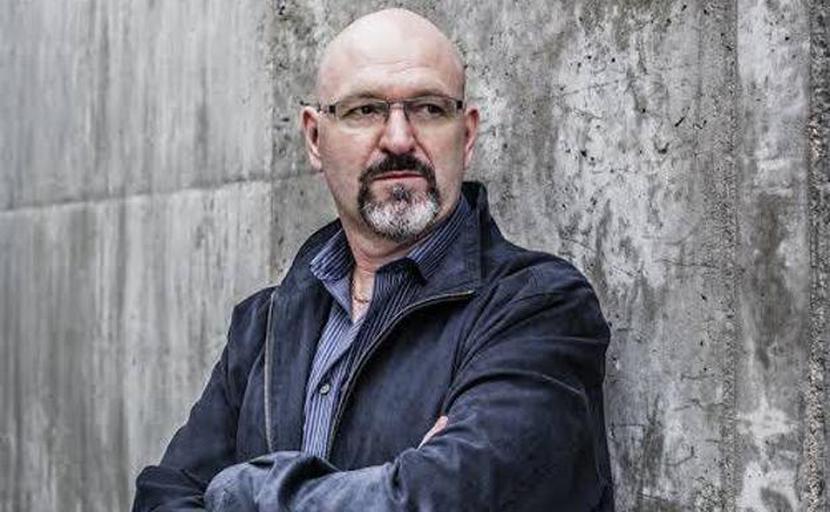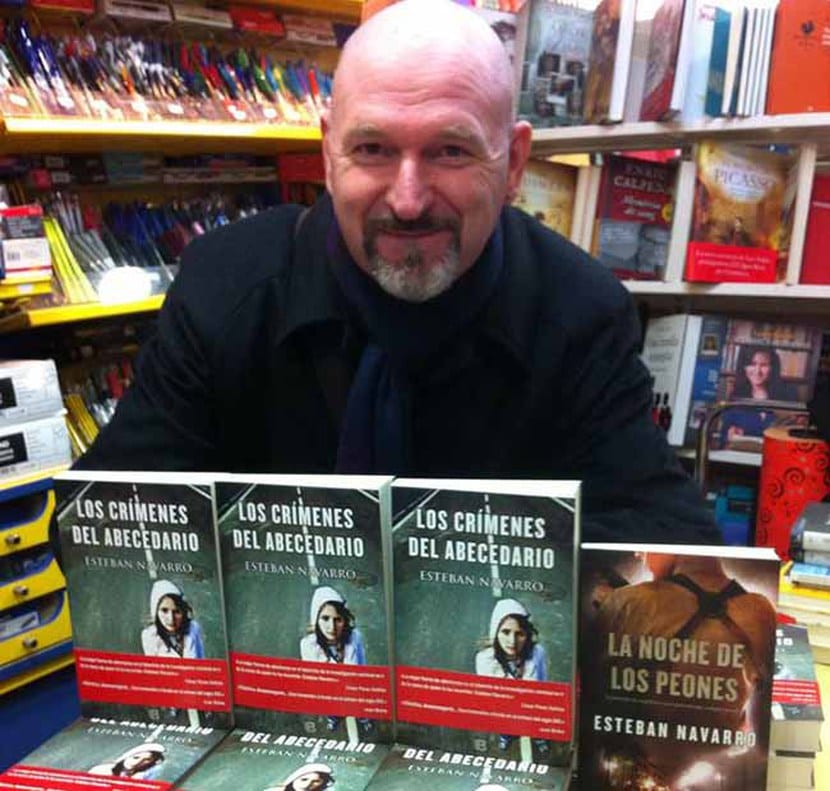
Esteban Navarro: writer and policeman.
We are pleased to have on our blog today Esteban Navarro, Murcia, 1965, writer and policeman, number one in sales on Amazon.
Actualidad Literatura: Murcian by birth and Huesca by adoption, national police officer and writer, multi-genre author and passionate about the black genre, professor at the Canarian School of Literary Creation, Creator of the Police and Culture Contest, Collaborator of the Aragón Negro Festival and collaborator with two regional newspapers of your adopted land, Aragon. A difficult person to pigeonhole, you move in different worlds. What are your passions, the driving force of your life and your stories? What is the man behind the writer like?
Stephen Navarro: Writing is, above all, a necessity. Or a disease, since I need a daily medication, which is writing. I think I have many things to tell and I need to tell them. He who does not invent does not live, said Ana María Matute on one occasion, and I feel that I must invent, create, and transmit what is invented and created through literature.
AL: «Click, good morning. Coffee and press. » This is how you wake up every morning on your Twitter account @EstebanNavarroS . More than 5.000 followers. The phenomenon social networks creates two types of writers, those who reject them and those who adore them. You seem to have a great relationship with them. Right now, after the sounded departure of Lorenzo Silva from Twitter, I can't help but ask you, what do social networks bring you? What do they bring positive in your life, in your profession? Do they outweigh the drawbacks?
EN: Social Networks find the engine of my own frustration by sharing everything I think is good. That is the magic of the RRSS, and the lie, because everything in them is, or we believe that it is, good. El Clic, good morning. Coffee and press is a way to start the day. To start and say that I have begun. I write it for others to read, but in reality it is a message that I say to myself: Good morning, Esteban. Start the day and go ahead with whatever. What compensates the RRSS is the use that you give to them. There is a lot of troll that seeks to do damage as if it were a scorpion that enters, stings and leaves leaving a trail of discomfort. If you know how to avoid (block) them and dispense with certain malicious opinions, the RRSS is above all a useful communication tool.
AL: Writers mix and centrifuge their memories and the stories they have heard to create characters and situations. You have stated in various media that the press gives you ideas, inspires you with scenarios and events for the novels you write. This makes your novels a reflection of today's society. Which of the different genres in which your novels are framed has more of a social barometer? What are the topics that interest you beyond the history that covers them?
EN: I usually write crime novels or detective novels. And this type of novel is very critical of society, because society must be criticized for it to improve. There are many things that are wrong and in the novel you have to make them manifest so that society reacts and knows how to see itself reflected. I like to write about the police because the police itself is one of the fundamental axes on which our society is sustained and in its hand is the solution to many of the evils, that is why it is important and essential that society believes in its police. I am interested in evil, but especially in the evil that we all carry inside, because that is the worst evil there is. The bad guys, we must not forget, are not those we cannot see, those who are far from us, the bad guys are us and they are among us.
AL: Mostly black gender but also science fiction with The Bearing Reactor and magical realism with The Gargoyle of Otín.
Is there a connecting line between all of them? What style do your readers prefer you with?
EN: The truth is that I don't think of readers when I write, because if I did I would not write. The relationship between Bering's Reactor, Otín's Gargoyle or A Police Story is that they are all stories, just set in different settings and with different characters.
AL: Most of the authors of the black genre are faithful to a protagonist, a detective, a policeman, a judge or a coroner, in your case, you are also multi-character, in the purest Agatha Christie style. We meet Moisés Guzmán and Diana Dávila in your novels. Is it easier for you to bring Moses or Diana to life?
EN: The characters are tools that I use for the novel. Using one character or another is a situation that the plot itself suggests. The characters are there when they are needed and they fulfill their role. Later, if they are no longer needed or do not fit in another novel, then they are dispensed with. The "performance" of Moisés Guzmán and Diana Dávila has been prolonged, because they were important for the stories he had to tell. Without them it would not have been possible, but answering the question, with Moisés I have felt very comfortable, perhaps because we are the same age and think in a similar way.

Esteban Navarro: Multi-genre writer with a passion for crime fiction.
AL: What are the special moments of your professional career as a writer and as a policeman? Those that you will tell your grandchildren.
EN: Unfortunately I have better memories as a writer than as a policeman. Regarding the police I have been disappointed, and much, after events that should never have happened, but have served to see evil and envy up close. Regarding literary memories, I prefer the week that I learned that I had been a finalist for the Nadal Prize. They were magical hours in which I touched the sky, and I knew that it was impossible for me to win that award, among other things because it was not from that publisher. But the fact of being there was already a prize.
AL: Your latest book, The Pentagon Mark, just published, is there already a next project? Are you one of those who begins the next novel as soon as the previous one ends, or do you need a time for creative regeneration?
EN: At first I said that I was sick with writing and that I needed to write constantly. I am always writing and always have projects in mind and sometimes I even write several novels at the same time. Right now, as soon as I finish this interview, I'm going to start writing right away.
AL: Any hobbies or habits when writing? When do you decide that a novel is ready for publication? Do you have people to whom you deliver your novels before making a final correction with their suggestions?
EN: My only hobby is that I don't start a novel until I have the title. I am unable to write on a blank page without a title of the novel. My first reader, my best reader, is my wife; He always reads my manuscripts and contributes his grain of sand.
AL: There was a lot of trouble with your novel A Police Story, which earned you a complaint from your colleagues at the Police Station. In the end, common sense prevailed and it did not come to anything serious. 24 years in the police force, of which 15 in Huesca, a whole life dedicated to the body and a continuous tribute that you do to it through your novels. Is there a before and after in your life as a police officer for this unfortunate event?
EN: That unfortunate event, as you say, has changed everything. Nothing is the same, nor will it be. Heraclitus said that no one bathes twice in the same river, and with that outrage the river has changed, but the one who bathes has also changed. I have been disappointed and have realized how far envy can go. At the end of a very serious offense that they were asking for, everything has been a warning, which is something like a slap on the wrist. And it is that I have always maintained that I have not done anything wrong. Nor will I.
AL: I never ask a writer to choose between his novels, but I do ask to know you as a reader. What was the first book you remember, the one that impacted you or led you to think that perhaps, one day, you would be a writer? Any author that you are passionate about, the kind you buy the only ones that are published?
EN: One of the books you have marked me was, without a doubt, "The Picture of Dorian Gray." And my childhood book was "Logan's Run," I think I read it half a dozen times.
AL: With 14 published novels, number one in sales on Amazon, consecrated writer of the crime novel, rubbing shoulders with the greats, numerous awards and recognitions to your credit, you have published with different publishers and have opted for desktop publishing, in a way intermittent… Own decision or is it so difficult for a large publisher to bet on a writer, even if one is already as consolidated as Esteban Navarro?
EN: The issue of editorials is catastrophic. In fact, now I don't have a publisher because Penguin Random House, which Ediciones B has acquired, no longer publishes me. Ediciones B has not published me since 2015, so it can be said that I do not have a publisher. But if I have to be frank, I don't care, because what I like is writing and I keep writing. I am accumulating novels and I started publishing myself and I will continue there.
AL: Is it possible, in these times, to live by writing?
EN: No.
AL: Recognized by Amazon as one of the founders of the Kindle generation,
How do you see the future of the paper book? Can it coexist with the digital format?
EN: It can and will have to coexist, although the role will lose more and more relevance.
AL: Does literary piracy hurt you? Do you think we'll end him one day?
EN: We will not finish, and I think it will go further. Do you remember the video stores?
AL: To close, as always, I am going to ask you the most intimate question that a writer can ask: Why do you write?
EN: Because I need it.
Thanks Esteban Navarro, wish you many successes, that the streak does not stop, and that you continue to surprise us with each new novel.